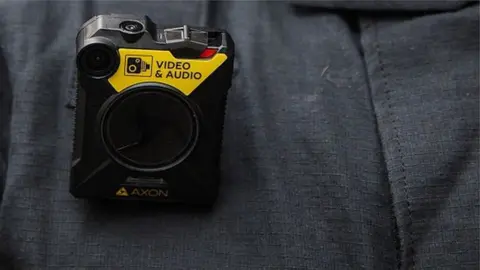Body-worn cameras to be compulsory for bailiffs
 Getty Images
Getty ImagesBody-worn cameras are to be compulsory for bailiffs under government plans to improve the treatment of people in debt.
The Ministry of Justice said the move, which only affects England and Wales, should help protect those in debt from "intimidation and aggression" used by some bailiffs.
But Citizens Advice said the cameras would do "nothing" to protect people.
It wants an independent regulator to crack down on the industry.
"Bailiff body cameras will do nothing to protect people while there is no industry regulator to oversee how they are used," said Citizens Advice chief executive Gillian Guy.
"While it's encouraging the government has committed to further action, its next step must be the creation of an independent regulator to crack down on rule-breaking bailiffs."
The body cameras will have to be worn by around 2,500 certificated enforcement agents, or bailiffs, who collect all sorts of debts including those related to council tax, traffic penalties and rent arrears.
High Court enforcement officers will also wear the cameras, but the measure will not apply to county court bailiffs.
The MoJ says it will work with the industry to make the cameras compulsory as soon as possible.
Debt collection saw major reform in 2014 but campaigners say more action is needed.
Citizens Advice has highlighted numerous issues, including bailiffs refusing to set up offers of affordable payments, charging excessive fees and misrepresenting their rights of entry.
'Unacceptable' tactics
The government is holding a consultation on how to tackle aggressive tactics in the industry, as well as finding ways to protect vulnerable people.
"The use of intimidation and aggression by some bailiffs is utterly unacceptable, and it is right we do all we can to tackle such behaviour," said Justice Minister Paul Maynard.
"Whilst most bailiffs act above board, body-worn cameras will provide greater security for all involved - not least consumers who are often vulnerable."
The Civil Enforcement Association, which represents bailiff firms, said: "This decision offers reassurance to the public that standards are consistently high and gives protection to our agents who do a difficult job on behalf of local authorities."
